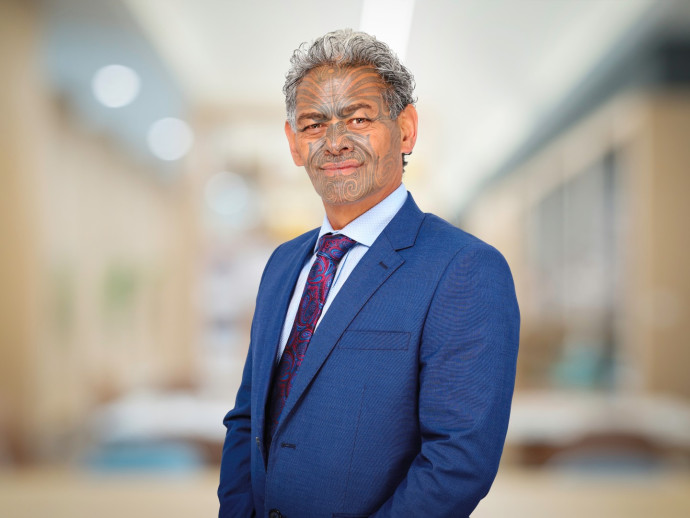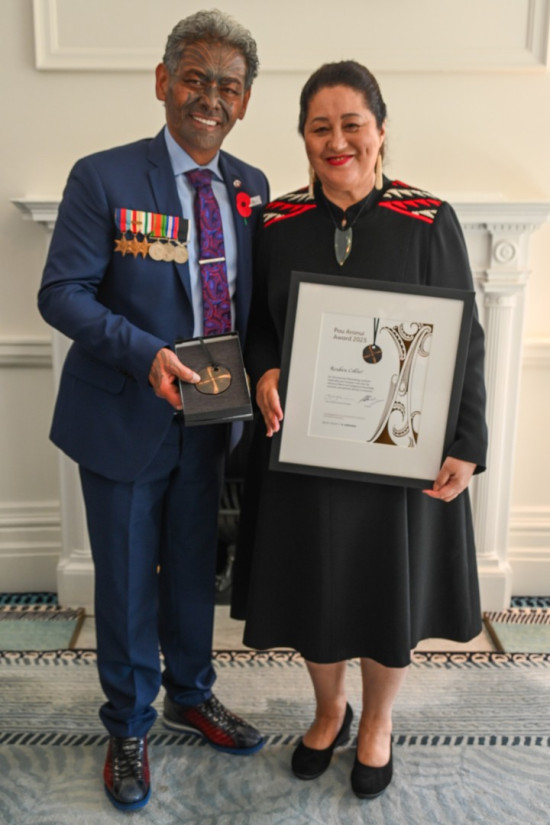2025 Pou Aronui Medal: Advancing Indigenous knowledge and scholarship

Dr Reuben Collier MNZM (Horouta, Mataatua, Te Arawa, Tainui) of Te Whare Wānanga o Awanuiārangi has received the Pou Aronui Award for distinguished service and sustained contribution to the humanities.
Reuben is recognised for documentary filmmaking, academic leadership, and visionary work that have advanced Māori language, culture, and historical memory, strengthened Indigenous knowledge and research, and helped shape Aotearoa New Zealand’s national identity.
His career bridges media, academia, and public service. Internationally acclaimed for directing Tangi ki Te Arikinui, the state funeral broadcast for Te Arikinui Dame Te Atairangikaahu, Reuben brought Indigenous ceremonial practice to global audiences with dignity and authenticity.
Equally defining is his enduring engagement with the 28th (Māori) Battalion through landmark documentaries, commemorative journeys, and expert testimony to the Waitangi Tribunal’s Military Veterans Inquiry.
As an academic, he developed Tohu, a Whakaaro Māori research framework expressed as spatial epistemology, which has transformed doctoral education and advanced Indigenous scholarship internationally.

Reuben says he drew inspiration from those who trusted him to record their voices.
“I felt a deep responsibility to ensure that Māori language, tikanga, and lived histories would not fade into silence or fragmented memory.”
He explains that his work seeks to address the marginalisation of Indigenous voices in the historical record and in higher education. Media and documentary filmmaking, he says, offer pathways to translate research into narrative and preserve cultural memory.
His projects create repositories that capture the breadth of iwi and whānau experience, while research frameworks such as Tohu enable Indigenous postgraduate students to undertake scholarship rooted in tikanga, kawa, and wānanga traditions.
“At its heart, this work ensures that Indigenous knowledge remains preserved and recognised as rigorous, legitimate, and vital within the academy and beyond.”
Reuben views the camera as a guardian entrusted to protect memory and truth. He recalls Tangi ki Te Arikinui as one of his most sacred moments and speaks with equal reverence of his long association with the “gallant” 28th (Māori) Battalion.
“Travelling with veterans, their wives, and whānau to battlefields and war cemeteries in Italy offered an education beyond archives or texts. It revealed the depth of sacrifice, the intergenerational weight of grief, and the importance of remembrance in transmitting cultural memory.”
He acknowledges many challenges along the way.
“Indigenous voices were often questioned, resources limited, funding scarce.”
Reuben hopes to see Indigenous knowledge accepted as an equal partner among global knowledge systems, shaping interpretations of the past and frameworks for the future.
“Aotearoa must act boldly to expand Indigenous repositories of knowledge through sustained investment in Māori-led research, digital archiving, and kaupapa Māori education policy.”
He believes Māori knowledge represents “a living, adaptive and globally resonant force.”
“When honoured with integrity and given its rightful place in scholarship, it offers models of resilience, innovation, and leadership that fortify the cultural and intellectual strength of Aotearoa New Zealand.”
On receiving the award Reuben feels deep humility.
“For me, this recognition affirms the value of Māori voices, traditions, and memories within the humanities. I give my heartfelt thanks to the elders and families who welcomed me into their homes and marae and entrusted me with their stories.”
He acknowledges his mentors Sir Hirini Moko Mead, Sir Pou Temara and Sir Timoti Kāretu, and pays tribute to the late Dr Wharehuia Milroy, Dr Hirini Melbourne, and the pioneering voices of Whai Ngata, and Derek Fox.
“Most of all, I thank my whānau, hapū and iwi. This award belongs to them as much as to me. Their aroha forms the foundation from which every story and every lesson emerged.”
He dedicates this honour to future Indigenous scholars who will carry these foundations forward into unimagined futures.
Pou Aronui Medal:
The Pou Aronui Medal is for distinguished service and sustained contributions to the field of humanities.
Citation:
To Reuben Collier for documentary filmmaking, academic leadership and visionary work, that has advanced Māori and Indigenous knowledge, research, and national identity in Aotearoa.
